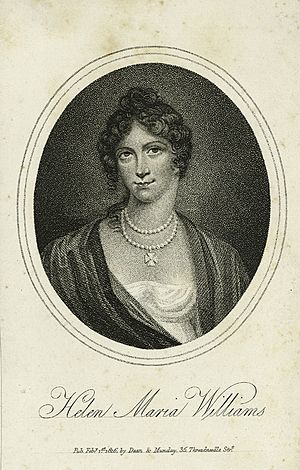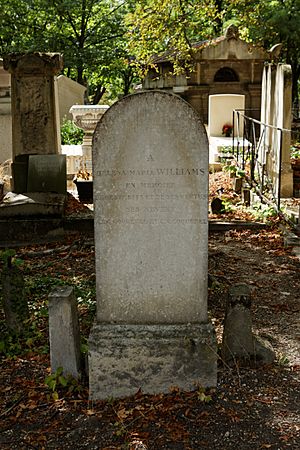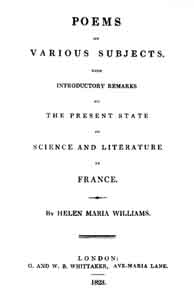Helen Maria Williams facts for kids
Quick facts for kids
Helen Maria Williams
|
|
|---|---|
 |
|
| Born | 17 June 1759 London, England |
| Died | 15 December 1827 (aged 68) Paris, France |
| Resting place | Père Lachaise Cemetery |
| Occupation | novelist, poet, memoirist, reporter |
Helen Maria Williams (born June 17, 1759 – died December 15, 1827) was a talented British writer. She wrote novels, poems, and translated books from French. Helen was a dissenter, meaning she had different religious beliefs from the main church. She strongly supported ending slavery (called abolitionism) and believed in the ideas of the French Revolution. Even though she was put in prison in Paris during a very scary time called the Reign of Terror, she spent most of her life in France. She was a well-known person in her time.
Contents
Growing Up and Learning
Helen Maria Williams was born in London on June 17, 1759. Her mother, Helen Hay, was Scottish, and her father, Charles Williams, was a Welsh army officer. She had two older sisters, Cecilia and Persis. Her father passed away when Helen was only two years old.
Before he died, her father had worked as a secretary in Minorca, which was a British territory. He earned enough money so that his wife and daughters could live comfortably from his savings and a pension. After his death, the family moved to Berwick-upon-Tweed. Helen often said she grew up in a "family of women" because it was just her mother and sisters. She described her early schooling as "a confined education," meaning it was quite strict and limited.
Becoming a Writer
In 1781, Helen's family moved to London. There, she met Andrew Kippis, who greatly helped her writing career and shaped her political ideas. He also introduced her to many important thinkers in London at the time.
Her book of Poems, published in 1786, covered many topics. These included religion and even criticism of how the Spanish Empire treated its colonies. She used her writing to speak out against war in a poem called "Ode on the Peace" (1786), which was about Peru. She also wrote against slavery in "Poem on the Bill Lately Passed for Regulating the Slave Trade" (1788).
Supporting the French Revolution
Helen strongly supported the French Revolution. In 1790, she wrote a novel called Julia, which showed her support. She bravely traveled alone to revolutionary France, where she stayed with Mme. Du Fossé, who had taught her French in London. Her book Letters Written In France showed a shift in her writing, from mostly poetry to prose (like stories and essays).
She was very excited to attend the Fête de la Fédération, a big celebration on the anniversary of the storming of the Bastille. After a short visit back to London in 1791, she became a strong defender of the Revolution, even though she didn't agree with everything it did. She returned to France in July 1791 and published a poem called "A Farewell for two Years to England." She did visit England again briefly in 1792, but only to convince her mother and sisters to join her in France. This was just as the Revolution was becoming more violent.
Life During the Reign of Terror
After the terrible September Massacres of 1792, Helen sided with a political group called the Girondists. She also hosted famous people like Mary Wollstonecraft, Francisco de Miranda, and Thomas Paine at her home, which was a popular meeting place (a salon).
When the Girondists lost power and the scary Reign of Terror began, Helen and her family were put in the Luxembourg prison. While in prison, she was allowed to keep working on translating French books into English. One of her most popular translations was of Bernardin St. Pierre's novel Paul et Virginie. She even added her own prison sonnets to it.
After being released, she traveled to Switzerland with John Hurford Stone. Her few poems from this time still showed her strong religious faith. In 1798, she published A Tour in Switzerland, which described her travels, shared her political thoughts, and included a poem called "A Hymn Written Amongst the Alps."
Later Years and Writings
In 1801, Helen published Sketches of the State of Manners and Opinions in the French Republic. This book showed that she still believed in the original goals of the French Revolution. However, she was becoming less happy with the rise of Napoleon. When Napoleon became emperor, he declared her poem "The Peace signed between the French and the English" (also known as the "Ode on the Peace of Amiens") to be against France. But Napoleon was more forgiving than the earlier revolutionary government. She spent only one day in prison and continued to live and write in Paris.
After the French monarchy was restored (called the Bourbon Restoration in France), Helen became a French citizen in 1818. In 1819, she moved to Amsterdam to live with a nephew she had helped raise. But she wasn't happy there and soon returned to Paris. She lived there until her death in 1827. During this time, she continued to be an important writer who helped English speakers understand French ideas and culture.
Key Works
Helen Maria Williams wrote poetry, novels, and collections of letters. She also translated many works. Sometimes, she would even include her own poems in the introductions of other people's books she translated.
Poetry Books
- Edwin and Eltruda. A legendary tale, 1782 (her first published work)
- An Ode on the Peace, 1783 (celebrated the end of the American Revolution)
- Peru, A Poem. In Six Cantos, 1784 (an epic poem that criticized European colonialism)
- Poems, 1786
- A Poem on the Bill Lately Passed for Regulating the Slave Trade, 1788
- A Farewell, for Two Years, To England, 1791
- "Ode to Peace," published in the Morning Chronicle, 1801
- Poems on various Subjects, 1823 (included "The Bastille, A Vision")
Novels
- Julia, 1790
Non-fiction Books
- Letters Written in France, 8 volumes, 1790-–1796
- A Narrative of the Events Which Have Taken Place in France, from the Landing of Napoleon Bonaparte ... Till the Restoration of Louis XVIII ..., 1815
- Letters on Events which have passed in France since the Restoration in 1815, 1819
- A Tour in Switzerland, 1798
Translations
- Paul and Virginia by Bernardin de Saint Pierre
- The political and confidential correspondence of Lewis XVI with observations on each letter. London and New York, 1803
- She also translated several works by Alexander von Humboldt (who was German but wrote in French) into English.
 | Tommie Smith |
 | Simone Manuel |
 | Shani Davis |
 | Simone Biles |
 | Alice Coachman |



